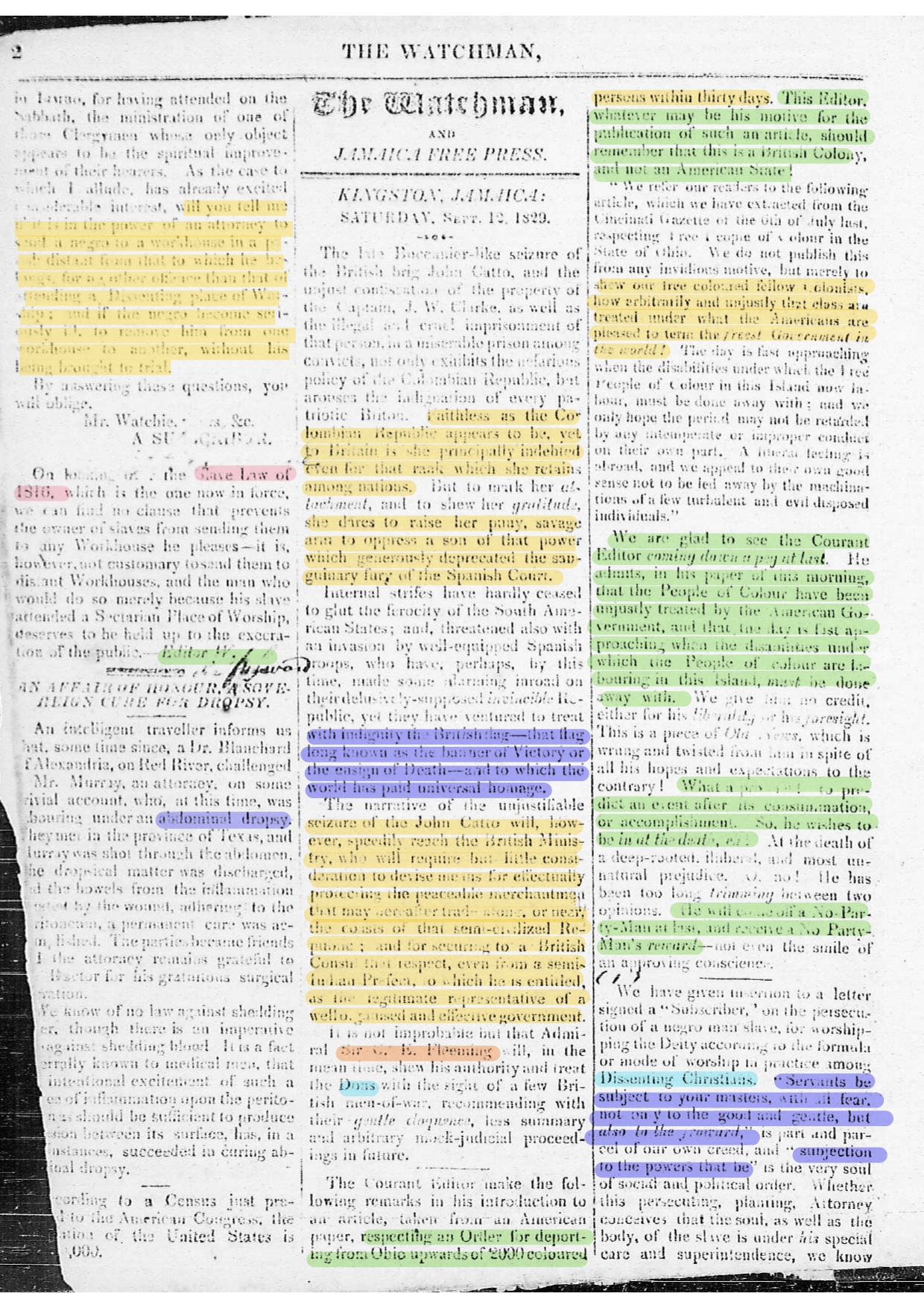
A Workhouse, also known as a Sugar House, was a site of punishment that epitomized the brutality of enslaved peoples, and for a time, also free peoples of color.19 Punishment in these Workhouses was in the form of whippings, padding, and a treadmill. After those being punished were locked away in small suffocating cells. Enslavers would send their enslaved to workhouses as a form of punishment and often did not have to provide a reason. Enslaved people would also be sent to Workhouses as they awaited to be transferred to another plantation, state, or enslaver. The workhouses also concealed and stopped runaways. In the 1820s, Workhouses seemed to be an essential part of the system of slavery, especially in its ability to enable fear and obedience.20
Considering how much control the Workhouse had and the little regulations it contained early on, it seems unlikely an attorney would be able to help an enslaved person get out of a Workhouse as punishment, especially if their main argument was illness.
The Barbados Rebellion, also known as the Bussa Rebellion, took place on April 14th, 1816 and is known as one of the first and largest slave rebellions. The colonial militia was sent to defeat the rebellion as its mass alarmed slave holders and governments. Thus "the Slave Law of 1816" could refer to a new law that stricken planter's and slaver's hold on their slaves, or it could refer to an updated law that was previous enforced. Either way, any regulations on plantation and the institution of slavery was affected by the Barbados Rebellion.17
For further reading on the Barbados Rebellion and other slave Rebellions, read: Hilary McD. Beckles' "The Slave-Drivers' War: Bussa And The 1816 Barbados Slave Rebellion."
The Editors of the Watchman are responding to the Subscriber's question on Workhouses above.
Abdominal dropsy is the swelling in the abdomen/lower stomach with an excess of fluid.
Though the Colombian Republic is disloyal, it is still indebted to Britain even at its national rank.
Instead of showing loyalty, the Colombian Republic oppresses "a son" who expressed disapproval of the bloodshed caused by the Spanish Court.
The Southern American States are threatened by a well-equipped Spanish invasion. They have ventured to treat the British dag with indignity (the British banner of Victory or the ensign of Death) which the rest of the world is also indignant to.
The seizer of the John Catto, what appears to be a British ship, will reach the British Ministry and they will devise a plan to allow the "peaceable merchantmen" to trade and near coasts of "that semi-civilized Republic." - this semi-civilized Republic refers to the Colombian Republic as they seized the ship.
Admiral Sir Charles Elphinstone Fleeming (1774-1840) served during both the French Revolution and the Napoleonic wars as a British Royal Navy officer. He was commander-in-chief of the West Indies for a year in 1828. He was also a Member of Parliament.18
A Spanish Gentleman.
Oberlin College was founded in 1833 by John Shipherd and Philo Stewart and was inspired by Pastor John Frederick Oberlin. The University was founded on the line of anti-slavery principles and social reform. They accepted any student regardless of race or sex and guaranteed freedom of speech. This was very radical for its time.
A group of students, The Lane Rebels, at Lane Seminary often debated and discussed about the abolition movement and were strongly opposed to the American Colonization Society. Since these conversations on abolition were rejected by their institution, The Lane Rebels decided to transferred to Oberlin College. As much as the Lane Rebels needed a space to freely converse and learn, Oberlin was going through a financial crisis and needed the Lane Rebels to strengthen their student body.
Eventually, Oberlin became a safe place for runaway enslaved people and peoples of color to live and learn.19
Though this deportation may have limited connection to Oberlin, as this newspaper is dated in 1829 and Oberlin was not founded until 1833, it is still relevant to reference this important connection.
What should be noted is that the editor refers to the persons being deported as "coloured persons" instead of enslaved people.
This American article that the Courant Editor protests about is written towards "free coloured fellow colonists" and demonstrates the unjustness of the classes within the Americas, a country that is supposed to be the freest in the world.
The article predicts that soon the oppressive restrictions imposed on free peoples of color in Jamacia will soon be extinguished.
The Courant Editor hope this good sense will not be consumed by "evil disposed individuals."
The Watchman editors praise the Courant Editor for acknowledging the unjust treatment peoples of color have endured from the American Government. Both the Watchman and the Courant predict that freedom is fast approaching, however the Watchman demonstrates that this goal is not new and is one that their paper strives to achieve through many of their newspaper articles.
The Watchman editors illustrate that many media platforms such as the Courant Editor's newspaper has probably publish false allegations and pro-slavery comments in the past. However, now (in 1829) that abolition is increasingly becoming possible and the abolitionist movement grows, these newspapers switch interests in order to be viewed in a better light by the media. This is most evident when the Watchman Editors comment, "to predict an event after its consummation or accomplishment." When the Watchman notes that the Courant shifts between two opinions, this could indicate that many newspapers need to be able to shift between public opinions quickly. Or this could allude to the fact that the Courant is unsure of its political position.
A term to describe Protestant groups who have little in common except for their refusal to conform to the Church of England. They rather create their own establishments rather then have the state or church interfere with their religion.20
The Subscriber writes that servants must conform and obey their masters, both the good and gentle and the difficult (Froward).
